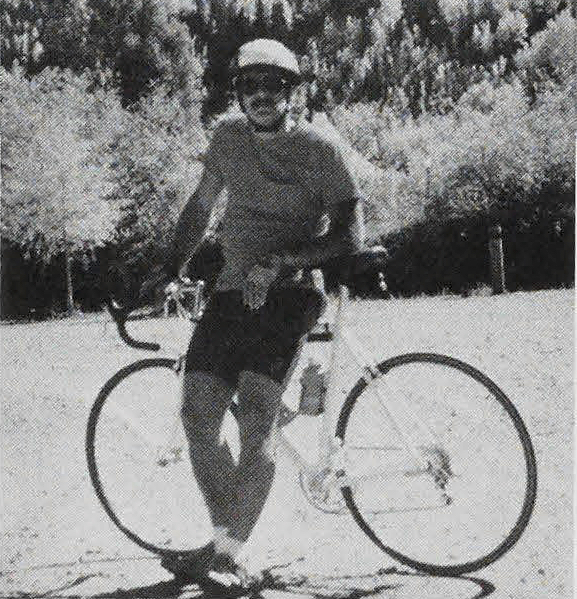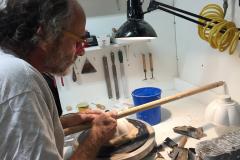Burnout
After fifteen years of making pottery, I decided it was time to stop. It has been well over a year now since I made that choice, and although my life has changed greatly during this time, there has not been a day in which I have not thought about pottery or my previous business.
What has become clear, is why I decided to give up making pottery. The biggest struggle was to understand and acknowledge that I was mentally and physically burned out. I also needed to understand how this came about in a situation that had every indication of success.

My career as a production potter and designer could best be described as meteoric. In fact, it was resplendent with wonderful studio cum home in a renovated cigar factory in the heartland of Pennsylvania. For many years I had been juried into the top wholesale shows, had numerous gallery exhibitions, and enjoyed a growing business with a full ledger of active accounts. I was respected and admired by my peers. I had successfully made the transition from totally handthrown ware to jiggered ware. My employees were hard working and their employment with me was secure.
While there was growth and movement, I was not happy. I remember telling myself that in the not too distant future, when the business was at a level where others could manage and run it, I would have time to pursue "my own work" or work of a more "personal" nature. I refused to admit that my production line was my own work and that it was, indeed, quite personal.
My attitude was getting in the way, fostered perhaps by my educational experience in ceramics that defined functional pottery as an invalid art form. This prejudice was reinforced by an inferiority complex, shared by many of my colleagues, about where I fit in the art/craft world. I use "inferiority complex" for lack of a better description. Even though many of us were well respected by our peers and by retailers and some had gained entry into juried events or had been published or received other notoriety, there was still that self-denigrating attitude of "Wasn't it just pitchers, mugs, oil candles, and platters?" After a few years my retort to that question was, "And so what?" Functional work was as valid as any other form of clay expression. What I refused to see was that it was indeed the best product of my endeavors. It was irrelevant that there was—is—volumes of other work being produced of lesser or greater merit. It is only art—or non-art—because someone of questionable ability and/or qualifications says it is so. Right? My brain and ego told me that running a pottery manufacturing business was of less value or worth than making a limited production of so-called major works. In retrospect I realize how unfortunate it was that so much of my energy was uselessly expended in struggling with that dichotomy. What I pursued for fifteen years was and still is valid to this day. It had strength, integrity, value, and a niche in the growing marketplace.
Many questions were omnipresent: how could I grow through my work on a day-to-day basis when routine consumed each hour? What was growth, and how would I measure it? How could I push my business to show a better profit-loss statement and at the same time satisfy my need for personal growth within my work? What about the ongoing production, marketing, and loan payments? And, most important of all, how to develop a life of content and meaning outside the workplace, not only with friends but also within a marriage?
My former partner, Jan Huling, urged me to regard the big picture and take a series of well-calculated small steps, and not my usual method of taking the most difficult step of setting unrealistic goals under extremely severe time constraints.
I saw myself working harder and not smarter each passing year, and questioned what I was getting in return for my efforts. I saw a leveling out of business growth, and more hard work and more pottery. I measured my own success by standards that were not mine. What I perceived as the success of colleagues who pursued pottery in similar ways, I chose to apply as my own standard of success. I also began to measure my worth as a human being against the acceptance or rejection of my work from crafts retailers or from juried shows.
So what burned me out? It would be easy to ascribe blame (if that is the word) to everything external. But ultimately I burned myself out. The reasons were boredom with routine, inability to roll with the economic roller coaster, and difficulty in separating the studio world from a life outside the studio.
I remember that when I took myself too seriously, my sense of humor declined. I was so consumed by making pots that I would not let myself grow to feel valued and comfortable. I wondered what it all meant. I wondered if today's pots would end up in tomorrow's yard sales. Were we making knickknacks for the future? I still wonder about this, but ifs refreshing now not to be involved. I am able to accept the consequences of what has happened and think I have grown in wisdom through my past experiences.
What am I doing now? I've moved to Telluride, Colorado, where I work in the ski industry. I'm pursuing some other interests and business ventures, one of which is a small pottery studio. I ski and cycle in season. I'm happy with my choices.

